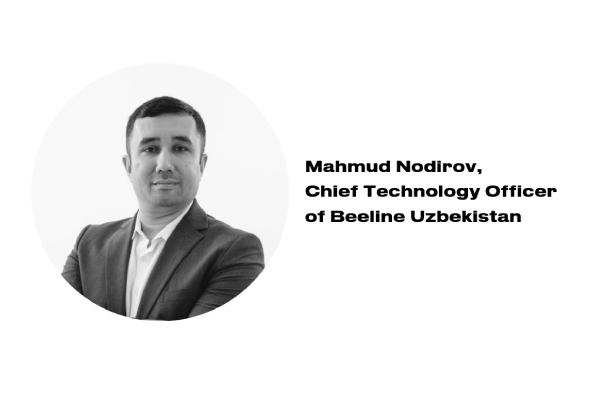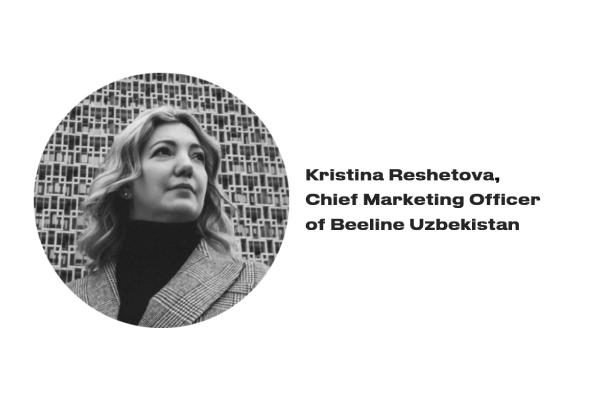
Mobile communication in Uzbekistan: what awaits subscribers in the near future
Tashkent, Uzbekistan (UzDaily.com) -- Beeline Uzbekistan’s Chief Technology Officer and Chief Marketing Officer spoke about the key trends driving the industry’s development in Uzbekistan and what users can expect in the next few years.
What can Uzbekistan residents expect in the near future? What are the current trends impacting the mobile communication market in Uzbekistan, and how is the industry developing?

Beeline Uzbekistan’s Chief Technology Officer, Mahmud Nodirov:
In the near future, Uzbekistan residents can expect significant improvements in network coverage, minimizing situations where customers face a lack of connectivity in certain areas, and enhancing the quality of services provided in current service areas.
The LTE network is expected to reach the entire main territory of the country by 2025. As part of a significant technological upgrade, operators are moving to 4G, with some already implementing 5G. I believe that mainstream use of 5G technologies in Uzbekistan will begin in 2025, becoming a key direction in the development of the mobile communication field in the coming years.
There is a large number of tariffs with completely different parameters now in the telecom market. Do consumers understand the nuances of their tariffs? Is there a tendency towards a more personalized approach to each customer?

Beeline Uzbekistan’s Chief Marketing Officer, Kristina Reshetova:
Indeed, each mobile operator has a set of tariff plans and services that are periodically updated and supplemented, and users may struggle to understand all of the nuances, characteristics, and tariff content.
We have the Beeline Uzbekistan mobile application, which helps with understanding information and raises knowledge of the product range. It is a useful tool for getting answers to the most frequently asked questions (such as my tariff, its subscription fee, when I need to pay for the tariff, what amount of traffic and set of services it includes, etc.), as well as tracking traffic usage by tariff or package, managing connected services, receiving online details at any time, adding numbers of close ones, and much more. All of this can be done without calling the contact center or visiting sales offices.
An individual approach, in the literal sense, is possible when the customer base is very small. In our case, such an individual approach would mean having at least 8+ million tariffs personally for each client in the portfolio.
Nevertheless, when launching any new product or offer, we attempt to consider our customers’ demands and provide subscribers with the opportunity to choose what they really need. For example, recently, with the help of a set of additional free "forces" in the new tariff line "MULTI KUCH," customers were offered a choice of eight different "forces" based on their interests in using specific services. And upon their activation, we see that customers actively use these "forces".
In addition, in the "Constructor" tariff, the customer can independently assemble a personal tariff based on their needs and preferences. Also, the company’s service portfolio includes many packages with access to specific resources that can be connected to any tariff plan.
Thus, we strive to meet each customer’s specific demands when using content and other services.
And how do you respond to customer feedback? Which is more essential to them: the quality of communication or the products?
Beeline Uzbekistan’s Chief Marketing Officer, Kristina Reshetova:
These two concepts are related. We closely monitor customer mood, paying special attention to feedback on social media, messengers, and other communication channels, as well as through surveys. We understand that without reliable basic services such as data transfer and voice communication, customers will not be able to fully benefit from products and services, and their attention will be lost. Therefore, ensuring high-quality communication remains our top priority.
In 2023, we launched mobile communication in the capital’s metro and provided fixed wireless internet access using WTTx technology. The implementation of VoLTE technology in late October improved the quality of voice transmission. Additionally, to increase internet speed and expand the network coverage area, we upgraded more than 1700 base stations.
In 2024, we plan to carry out the most extensive rollout and modernization of base stations in Beeline Uzbekistan’s history, which will significantly improve the availability and quality of communication services and fully meeting customers’ basic demands.
At the same time, we strive to offer innovative products that match our consumers’ current needs and expectations. Our goal is to provide users with the opportunity to effectively deal with their challenges in every aspect of life through Beeline services.
This year, the global industry is likely to see an increase in the implementation of 5G networks, with experts predicting that the number of subscribers on these networks will reach 2 billion by 2025. When will Uzbekistanis be able to fully utilize the benefits of 5G?
Beeline Uzbekistan’s Chief Technology Officer, Mahmud Nodirov:
China, which is already fully covered by a fifth-generation network, has more 5G base stations per capita than Uzbekistan’s 4G base stations. With a population of 1.5 billion people, China already has 3.7 million base stations covering the entire country.
Currently, the United States, Europe, and the Middle East are actively competing for technological development. Approximately 95% of the territory of Arab countries is already covered by 5G today. India is also joining this process, so the figure of 2 billion does not seem unattainable to me. In fact, this will become a reality.
Uzbekistanis can already use 5G in major cities such as Samarkand, Tashkent, and some areas of the Valley. Right now, subscribers will not feel a significant difference between 5G and 4G, except for speed, which can be intimidating at times — the battery runs out faster and internet packages are quickly consumed. However, 5G is not just about speed and easy internet access; it’s about new services such as Edge computing (reducing latency, fast data access, and reducing network load) and Edge gaming (improving gaming performance, avoiding the need to purchase "heavy hardware" for gaming at maximum settings, and playing online without delays). In this case, the user connects via 5G technology and uses computing capabilities located on remote servers in data centers.
The same goes for data storage. 4G has already allowed us to abandon many data carriers, such as DVDs, as streaming videos have replaced analog and cable television and radio. We have internet access; we don’t count megabytes; we connect to services provided by both independent providers and telecom operators and use the opportunities provided based on 4G technology. For instance, Beeline TV. We have surpassed the milestone of one million active users per month. This indicates that people choose convenience and take advantage of the possibilities offered by telecom operators.
Beeline works on these possibilities every day, 24 hours a day, 7 days a week, covering and anticipating the needs of our customers.
Why doesn’t Beeline phase out 2G and 3G?
Beeline Uzbekistan’s Chief Technology Officer, Mahmud Nodirov:
At present, in Uzbekistan, we do not turn off the 2G and 3G networks. Furthermore, I believe that 3G will be phased out before 2G. This is due to the fact that there are several voice services in the country, and people still actively use voice communication. Therefore, disabling the previous technologies, which were originally created for voice transmission, is currently impossible.
Additionally, there are services related to machine-to-machine (M2M) technology, meters (electricity meters, water and gas meters), and the Internet of Things (IoT) that transmit data through 2G and 3G networks. Turning off these technologies may prevent public-sector organizations from interacting with their clients. For example, "Hududgazta’minot", "Toshkent suv ta’midnoti" and others would be unable to provide their services, take readings, and issue bills, leading to a collapse.
But the most crucial aspect is the voice. Therefore, Beeline Uzbekistan was one of the first in the country to provide its customers with the VoLTE service. We aim to fully transition from 3G to LTE in the near future, within the years 2024–2025.
As mobile communication becomes an increasingly important element of daily life, what innovative services are gaining popularity in the local mobile communication market?
Beeline Uzbekistan’s Chief Technology Officer, Mahmud Nodirov:
The major contribution in the past year has been the implementation of Voice over LTE technology. The next stage, likely to be implemented, is VoWiFi (Voice over Wi-Fi), aimed at ensuring higher-quality voice services in public data networks.
Another important mission is to increase the density of base stations to provide better indoor coverage and, most importantly, to expand the overall network coverage. Today’s communication extends beyond speech and data transmission to include music, such as the Beeline Music service, which allows customers to stream millions of tracks without using data traffic. Geolocation services and navigation also require constant internet access. With their development and widespread use, people have become more interested in digital services that help save time in finding information, locations, and entertainment. The number of users of such services is constantly growing, and as a digital operator, we are ready to provide these services at the highest level.
One of the key future trends worldwide is the development and implementation of artificial intelligence (AI) and robotics. Is Beeline planning to integrate AI?
Beeline Uzbekistan’s Chief Technology Officer, Mahmud Nodirov:
Artificial intelligence (AI) has become an essential part of modern business, especially in the fields of service delivery and manufacturing. We have already successfully implemented AI in the processes of planning and optimizing base stations, as well as monitoring personnel activity. These elements are actively used and will continue to develop. Our strategy will focus not only on meeting internal employee needs but also on addressing the needs of the mass market. I am confident that this trend will strengthen in 2024–2025.
However, AI will not completely replace the work of human employees. We cannot fully rely on machines, considering the probability of errors. As communication complexities grow, AI complements human work. I am against delegating the final decision-making function to AI. Humans must always remain in control and make critical decisions. Although AI can collect data and provide analysis, final decisions must remain in human hands.